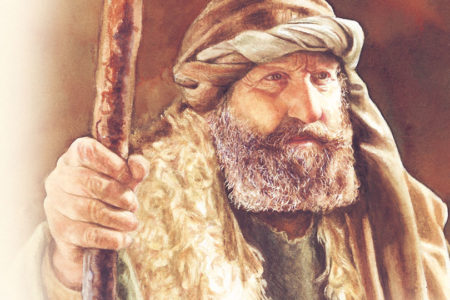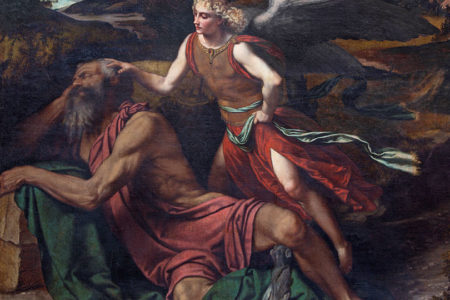Snapshots of Steadfast Faith: Hebrews 11:4–17
The Temple still stood gloriously on that high mount where the Dome of the Rock now rests. The Pharisees still controlled the synagogues, influencing the people with their strict interpretations of the law. The Sadducees still dominated the Temple and desired to maintain the status quo. The Essenes still refused to recognize the Jerusalem priesthood and sacrificial system, awaiting the last days at Qumran near the Dead Sea. The Zealots still terrorized the Romans for their goal of a liberated Jewish state. Add to this the immense pressure that Jewish believers of the first century faced within their own families to forsake Jesus as their Messiah and return to their former Judaism. These ingredients enlighten the background of the Epistle to the Hebrews.
This vital document trumpeted a truth to those Jewish converts with no uncertain sound: Jesus and the New Covenant are far better than returning to the Old Covenant of Moses. “No turning back” was the watchword for those Hebrew Christians. Persevering faith is still necessary for 20th-century believers. Ours is not a salvation by works but, rather, a salvation that works. As this epistle clearly states, believers are justified by their faith (Heb. 10:38). This faith perseveres. It never fizzles out under persecution. Listen to God’s warning and encouragement: “but if any man draw back, my soul shall have no pleasure in him. But we are not of them who draw back unto perdition, but of them that believe [have faith] to the saving of the soul” (Heb. 10:38b–39). This was no novel truth. God’s people have always been marked by steadfast faith.
Hebrews chapter 11 provides many flesh-and-blood examples of godly people who persevered without forsaking our Lord. Let’s look at the first three of these snapshots of steadfast faith—men who lived in the era before the worldwide flood. The Old Testament was yet to be written, but God was not silent. He spoke to mankind and offered salvation by faith in that word. Not only did these three individuals believe God’s message, they displayed courageous faith against extreme pressure.
Abel: The Sacrifice of Steadfast Faith
“By faith Abel offered unto God a more excellent sacrifice than Cain, by which he obtained witness that he was righteous, God testifying of his gifts; and by it he being dead yet speaketh (v. 4).
Abel, the second son of Adam and Eve, provides a clear example of resolute faith. His story is recorded in Genesis 4:1–15. In the newly created world, Abel kept flocks while Cain tilled the ground. Both tasks were necessary and noble. Both brothers sought a relationship with God and approached Him with offerings. Cain brought his offering from the fruit of the ground. Abel brought the firstlings of his flock along with their fat portions. How did God respond to the brothers and their offerings? “And the Lᴏʀᴅ had respect unto Abel and to his offering; But unto Cain and to his offering he had not respect” (Gen. 4:4–5). The difference between God’s smile and His frown was found in Abel’s faith and Cain’s unbelief. It was “By faith [that] Abel offered unto God a more excellent sacrifice than Cain.” Their distinct offerings expressed their different hearts. Both Genesis and Hebrews are silent as to how God indicated His acceptance of Abel’s sacrifice. Jewish tradition, continued by some Christian interpreters, states that God sent fire to consume the animal on the altar. This is based on later examples in Scripture, as when fire fell from heaven when Aaron initiated the sacrificial system (Lev. 9:24), Elijah prayed on Mount Carmel (1 Ki. 18:38), and Solomon dedicated the Temple (2 Chr. 7:1).
Why was Abel’s sacrifice “more excellent” than Cain’s? Some would say that it was solely because of Abel’s faith. Both offerings would have been acceptable, but either one without faith became unacceptable. Blood, this view argues, was not an essential part of the offering. But Genesis 4:4–5 states that both Abel and his offering were accepted and Cain and his offering were rejected. God took pleasure in more than what was in Abel’s heart. The Scripture links their faith or lack of it with their works.
The Lord God had previously revealed to this first family His laws of sacrifice and the importance of faith for salvation. He had demonstrated to Adam and Eve the importance of blood sacrifice as a symbol of substitution when He made “coats of skins, and clothed them” (Gen. 3:21). They probably explained this principle to their children. More evidence for these unrecorded revelations can be found later in Genesis. Noah knew about the laws of sacrificing clean and unclean animals because God commanded him to take both clean and unclean animals into the ark (Gen. 7:2, 8). Yet Genesis records no other details about the sacrifice of clean and unclean animals. Obviously God revealed more information to early mankind than Moses recorded in Genesis. It was this revelation that Cain refused and Abel obeyed. Cain “followed his own judgment in choosing a bloodless sacrifice, disregarding the importance of blood as explained by God to Adam and Eve, and disregarding the principle of substitutionary atonement that later found its complete fulfillment in the crucifixion of Christ.’’1
Abel is still speaking today. The only way to be right with God is through the substitutionary blood sacrifice of the Lamb of God, Jesus the Messiah. As Martin Luther so aptly observed, “He who when he was actually alive could not teach even his only brother by his faith and example, now that he is dead teaches the whole world.”2 Abel tenaciously believed God in spite of persecution by his brother Cain. Abel died for his faith—He was God’s first martyr. It is not surprising that Abel is listed first in this chapter’s record of faithful men and women.
Enoch: The Outcome of Steadfast Faith
“By faith Enoch was translated that he should not see death, and was not found, because God had translated him; for before his translation he had this testimony, that he pleased God” (v. 5).
The second witness from this gallery of the faithful is Enoch. His story is found in Genesis 5:21–24. Enoch’s resolute belief in the Almighty produced both a life on earth that “pleased God” and a final home with God in heaven. His transformation, apart from death, is both an exception to the norm and a pattern. All of God’s people (except Enoch and Elijah) have entered heaven by traveling through “the valley of the shadow of death” (Ps. 23:4). Pain and death have been the universal experience of both the saved and the unsaved. God’s people, however, can see beyond the curse of sin: “O death, where is thy sting? O grave, where is thy victory?” (1 Cor. 15:55). Death is merely a shadow, not a final reality. Beyond the grave lies life. In this sense, Enoch’s translation was an exception to the norm.
Yet Enoch’s experience of evading death’s grip provides a pattern for one particular generation of believers. Those who are alive when Jesus returns in the first phase of His Second Coming will escape the clutches of death, just as did Enoch. Paul described this wonderful event, the Rapture, with these words from 1 Thessalonians 4:16–17: “For the Lord himself shall descend from heaven with a shout, with the voice of the archangel, and with the trump of God; and the dead in Christ shall rise first; Then we who are alive and remain shall be caught up [raptured, as was Enoch] together with them in the clouds, to meet the Lord in the air; and so shall we ever be with the Lord.”
The hallmark of Enoch’s godliness was that he pleased God. What a wonderful description of the Christian life! Our walk with God must be marked with principled obedience and joyful service. As the Apostle John stated, “And whatever we ask, we receive of him, because we keep his commandments, and do those things that are pleasing in his sight” (1 Jn. 3:22).3
“But without faith it is impossible to please him; for he that cometh to God must believe that he is, and that he is a rewarder of them that diligently seek him” (v. 6).
The author of Hebrews then took the opportunity to expound on the importance of faith. It is absolutely indispensable. To be in heaven with God, people must be pleasing to Him. To be pleasing to God, people must have faith. Such faith and trust involve two elements. People must believe that God exists. This truth is displayed in nature as well as in the consciences of all people, as Paul stated in Romans 1:19–20, ending with the admonition, “so that they are without excuse.” Yet sinful people “hold [suppress] the truth,” which they know instinctively (Rom. 1:18). The first step back to God is to acknowledge His existence. The second step is to believe that God will reward diligent seekers. Such a prize is not a carnal appeal for selfish desires. Rather, the reward for those seeking God is God Himself! This echoes God’s call to Abram, “Fear not, Abram: I am thy shield, and thy exceedingly great reward” (Gen. 15:1).
Noah: The Conviction of Steadfast Faith
“By faith Noah, being warned of God of things not seen as yet, moved with fear, prepared an ark to the saving of his house, by which he condemned the world, and became heir of the righteousness which is by faith” (v. 7).
The third model of victorious faith is the man who stood alone against the whole world—Noah. He had been warned by God of things unknown to him. Noah knew nothing of rain, for as yet those drops had never fallen to the earth (Gen. 2:5). Noah knew nothing of worldwide flood, for this unique judgment had never occurred (Gen. 9:11, 15). Noah knew nothing about building a ship, for he lived far away from the seas. Only his steadfast belief in God kept Noah faithful at cutting the trees and planning the construction of the vessel.
Noah’s ark measured 450 feet long, 75 feet wide, and 45 feet high. It could not be hidden from the ridicule of scoffers. But the evil of his generation reached to greater proportions than the ark. “The wickedness of man was great … every imagination of the thoughts of his heart was only evil continually … The earth also was corrupt before God, and the earth was filled with violence” (Gen. 6:5, 11). Yet Noah and his family persisted in obeying God’s Word. His tenacious faith condemned the world of unbelief around him. Today’s world is tumbling fast toward the conditions of Noah’s day. The challenge still stands for God’s people to denounce the world around us by standing boldly for Christian values. Noah inherited the righteous standing before God that comes only by faith. Now is the time to believe God’s Word and receive His gift of righteousness through faith in Jesus Christ.
Conclusion
People could not believe the headlines of the newspapers in 1860. French acrobat and tightrope walker Charles Blondin stretched an 1,100 foot long tightrope some 160 feet above Niagara Falls. In a bold performance, he announced his intention to cross the falls blindfolded with a volunteer on his back. The crowds roared with approval. When Blondin approached one member of the cheering crowd, the man promptly refused. It was one thing to believe that the Great Blondin could carry a man over the raging waters, but it was quite another to trust him to do it. The faith that saves is the faith that is steadfast.
O for a faith that will not shrink
Though pressed by many a foe,
That will not tremble on the brink
Of any earthly woe …
Lord, give me such a faith as this,
And then, whatever may come,
I’ll taste even now the hallowed bliss
Of an eternal home.
—William H. Bathurst (1796–1877)
ENDNOTE
- Gleason L. Archer, Encyclopedia of Bible Difficulties (Grand Rapids, MI: Zondervan, 1982), 76.
- Philip E. Hughes, The Epistle to the Hebrews (Grand Rapids, MI: Eerdmans, 1977), 457.
- Jewish commentator Rashi suggests that Enoch died before his time because “his mind was easily induced to turn from his righteous ways and to become wicked” Pentateuch with Rashi’s Commentary (Silbermann: Jerusalem, 5733), 23. But Hebrews 11:5 clearly states that God took Enoch because of his godly life.







